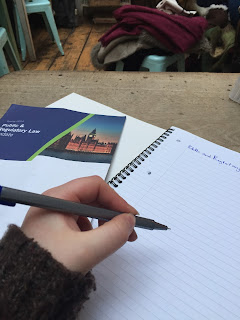Many of you who know me will know that
I am currently traveling around lots of universities picking out
which one I will attend for my proper law degree.
During my travels I've realised one key
thing; academics as Australia sees it is entirely flawed. When I
applied for Australian Universities they asked for one thing.
 |
| Foleys bookstore - haven for academics! |
My grades.
My entire academic year was spent with
the dreadful realisation that my entire legal future depend upon a
single number, one decimal too low and I'd be struck out of the
contest.
Generally I welcome competition,
finding it to be a rousing challenge that encourages all players to
strive to present their best. Yet throughout the year I observed
myself and my peers facing what was an increasingly obvious set of
biases. Some were in our favour and
some were against.
Australia operates several complex
systems of education, but all have some similarities. If you don't
understand or recognise what I describe, don't worry- chances are
it's different in your state, or no one ever told you.
As a student studying third year law
and high school I spent many hours traveling between academic
institutions. I had a passion for law and it grew throughout the year
as it fostered by my university. They were a wonderful beacon of
support and I owe them many thanks and gratitude; my issue is not
with the universities, the institutions or the people within them but
the poorly way in which the system is applied.
So what am I proposing?
Those in America or Europe have the
fantastic opportunity to provide a letter.
Generally known as a personal statement
these little excerpts usually sit at around 400-500 words and provide
some insight into the applicant's reason for applying.
For law, which is fast becoming
Australia's new throw-away degree, this would be an invaluable method
of assessment. Not only can you consider students based on aptitude,
but also on drive and passion. Many of my peers are choosing to study
law – but about 1% actually intend to join the legal force.
Why then are they
studying law?
 Many claim that understanding the law
gives them fantastic grounding in other careers. Never mind that
they'd be better served in management and economics or politics
course which gives them a working understanding of law and it's
implications upon society.
Many claim that understanding the law
gives them fantastic grounding in other careers. Never mind that
they'd be better served in management and economics or politics
course which gives them a working understanding of law and it's
implications upon society.
No longer do we see students
considering seriously what they apply to study. As the options are so
flexible that if you really truly wanted you could migrate all they
way from english literature to specialised medicine.
Is this fantastic?
No.
There are arguments for increased
flexibility- but I'd have to reply to all of those – I've never
seen so many Australians with a lack of passion. The question 'what
do you want to be?' is answered with laughs and 'I'm only
young, I don't want to be tied down.'
This mentality is devastating to our
young people. Not only does it create a culture where knowing where
you want to go in life at a young age is strange, almost comedic, but
it prevents exploration. From reception to year 11 students stroll
through, introduced to various careers in short brief meetings. Some
students may do work experience – but no one takes that seriously.
And in the end, you could have worked
as hard as you could, doing work experience, speeches, seminars,
reading, and none of it would matter.
The universities will never see that
work, nor will they be interested in it. The future will literally
rest upon how you compare to the rest of your country. A reasonable
thing when you consider you do want the best and brightest in
attendance...but do they always show up in high school?
And why would the best students put
effort in at high school? Consistent reminders that their futures are
far-far away and continuous reminders that choosing a career now will
'only tie them down' ensure no student bothers to put effort in. High
school seems like an endless desert, in which every work sheet is
just a time filler until the final year.
So why do I bother to
write about this now?
In foreign high schools the students
I've met have been encouraged from middle school to find a topic of
passion. Students have started up news letters, podcasts and even
contact great researchers in a bid to be their assistants. Lo and
behold, they have been successful. They are not tied down – and
while their system is far from perfect it does provide students with
empowerment.
Universities also receive the personal
statement, this statement shows off all the work they have done in
their field of passion.
Then the system truly becomes a
competition as students throw not only their academic scores into the
ring but experiences, revelations and future aspirations.
Universities suddenly have the blindfold removed and they can piece
together a cohort that will not only help each other to succeed but
will bring prestige and pride to a university.
I hope in the future, universities
around Australia will begin to implement the use of personal
statements.
Currently, as a recent graduate I feel
that Australian schools are failing to foster the maturity and
potential of other students. Therefore forward thinking and well
developed universities must implement the personal statements into
their application processes in order to find the students that are
not only academically brilliant but possess a passion or aspiration
that the university will be proud to help them achieve.

No comments:
Post a Comment